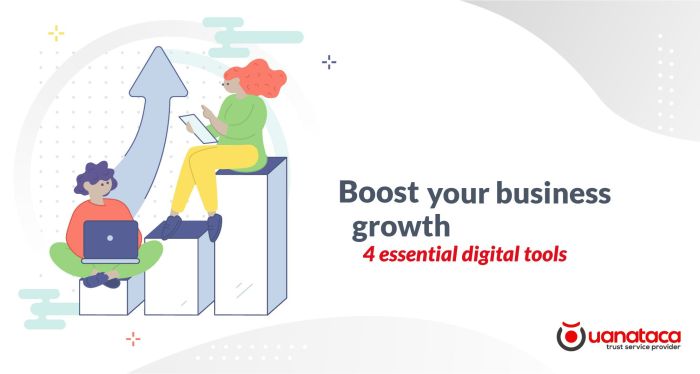Essential Tools for Digital Business Growth: A Comprehensive Guide
Embark on a journey into the world of digital business growth with Essential Tools for Digital Business Growth. This guide will delve into the key tools and strategies that can propel your business to new heights in the digital landscape.
Importance of Digital Tools for Business Growth
In today's digital age, utilizing the right digital tools has become crucial for businesses looking to expand and stay competitive in the market. These tools not only help streamline processes but also increase efficiency, allowing companies to operate more effectively.
Examples of Digital Tools for Business Growth
- Customer Relationship Management (CRM) software: CRM tools help businesses manage customer interactions, track leads, and improve customer retention rates.
- Social Media Management Platforms: Social media tools enable businesses to schedule posts, analyze engagement metrics, and reach a wider audience on various platforms.
- Analytics Tools: Analytics software provides valuable insights into website traffic, user behavior, and marketing campaign performance, helping businesses make data-driven decisions.
How Digital Tools Streamline Processes and Increase Efficiency
By automating repetitive tasks, digital tools save time and allow employees to focus on more strategic activities. These tools also facilitate collaboration among team members, improve communication, and enhance overall productivity within the organization.
Website and E-commerce Platforms
Having a professional website is crucial for the growth of a digital business. It serves as the online storefront, providing a platform for customers to learn about the business, its products or services, and make purchases conveniently.
The Significance of a Professional Website
A professional website enhances credibility, brand image, and customer trust. It allows for better customer engagement, showcases products effectively, and helps in reaching a wider audience globally.
Comparison of E-commerce Platforms
There are various e-commerce platforms available for setting up online stores, each with its own features and pricing. Some popular platforms include Shopify, WooCommerce, Magento, and BigCommerce.
- Shopify: Known for its user-friendly interface, extensive app store, and excellent customer support.
- WooCommerce: A plugin for WordPress, offering customization options and seamless integration with the CMS.
- Magento: Ideal for large-scale businesses, providing advanced features for scalability and customization.
- BigCommerce: Suitable for growing businesses, offering various built-in features and integrations.
Features to Consider in a Website or E-commerce Platform
When choosing a website or e-commerce platform, it is essential to consider features like:
- Mobile Responsiveness: Ensure the platform is optimized for mobile devices for a seamless user experience.
- Payment Gateways: Look for secure and diverse payment options to cater to customer preferences.
- Tools: Integrated tools for search engine optimization to improve visibility and ranking on search engines.
- Inventory Management: Efficient tools for managing inventory, tracking stock levels, and fulfilling orders.
- Customer Support: Access to reliable customer support to address any technical issues or queries promptly.
Customer Relationship Management (CRM) Software

Customer Relationship Management (CRM) software plays a crucial role in managing customer interactions and data for businesses. It enables companies to streamline their communication with customers, track sales, and build long-lasting relationships.
Benefits of CRM Software for Personalized Customer Experiences
- Improved Customer Communication: CRM software allows businesses to store customer contact information, interactions, and preferences in one central location, making it easier to personalize communication.
- Enhanced Sales and Marketing: By analyzing customer data and behavior patterns, businesses can tailor their marketing campaigns and sales strategies to target specific customer segments more effectively.
- Increased Customer Retention: With CRM software, businesses can provide timely follow-ups, address customer concerns, and offer personalized solutions, leading to higher customer satisfaction and loyalty.
- Efficient Data Management: CRM tools help in organizing and managing customer data efficiently, ensuring that valuable information is easily accessible to improve decision-making processes.
Popular CRM Tools and Functionalities
There are several popular CRM tools available in the market, each offering unique features to help businesses manage customer relationships effectively
| CRM Tool | Functionalities |
|---|---|
| Salesforce | - Lead management- Opportunity tracking- Sales forecasting |
| HubSpot CRM | - Contact management- Email tracking- Deal tracking |
| Zoho CRM | - Workflow automation- Sales pipeline management- Social media integration |
Digital Marketing Tools
Digital marketing tools play a crucial role in helping businesses reach a wider audience and create effective marketing campaigns. These tools encompass various strategies such as , social media marketing, email marketing, and more.
(Search Engine Optimization)
is essential for improving a website's visibility on search engines like Google. By optimizing content with relevant s and meta tags, businesses can attract organic traffic and increase their online presence.
Social Media Marketing
Social media platforms provide a valuable channel for businesses to connect with their target audience. Through engaging content, businesses can build brand awareness, drive traffic to their website, and foster customer relationships.
Email Marketing
Email marketing remains a powerful tool for businesses to communicate directly with their customers. By sending personalized messages, promotions, and updates, businesses can nurture leads and encourage repeat purchases.
Pay-Per-Click Advertising
PPC advertising allows businesses to target specific s and demographics with paid ads. This method can generate immediate traffic to a website and increase conversions through strategic ad placements.
Content Marketing
Content marketing involves creating valuable and relevant content to attract and engage a target audience. By providing informative blog posts, videos, and infographics, businesses can establish authority in their industry and drive traffic to their website.
Analytics Tools
Analytics tools are crucial for measuring the performance of digital marketing campaigns. By tracking key metrics such as website traffic, conversion rates, and ROI, businesses can refine their strategies for optimal results.
Data Analytics and Business Intelligence Tools
Data analytics and business intelligence tools play a crucial role in helping businesses make informed decisions and analyze trends for forecasting purposes. These tools provide valuable insights that can drive digital business growth.
Data Analytics Tools
Data analytics tools such as Google Analytics, Tableau, and Microsoft Power BI allow businesses to collect, analyze, and visualize data from various sources. By tracking website traffic, user behavior, and marketing campaigns, organizations can gain a deeper understanding of their target audience and make data-driven decisions to optimize their strategies.
- Google Analytics: This tool provides in-depth insights into website traffic, user demographics, and behavior, helping businesses monitor the performance of their digital platforms.
- Tableau: With powerful data visualization capabilities, Tableau enables businesses to create interactive dashboards and reports for better data analysis and decision-making.
- Microsoft Power BI: This tool allows users to connect to multiple data sources, prepare data for analysis, and generate interactive visualizations to uncover insights and trends.
Business Intelligence Tools
Business intelligence tools like IBM Cognos, QlikView, and SAP BusinessObjects are essential for analyzing trends, forecasting sales, and gaining a competitive edge in the market. These tools help businesses transform raw data into actionable insights for strategic planning and performance optimization.
- IBM Cognos: This tool offers advanced analytics, reporting, and dashboard features to help businesses track KPIs, identify patterns, and make data-driven decisions for sustainable growth.
- QlikView: With its associative data modeling and visualization capabilities, QlikView enables businesses to explore data relationships, uncover hidden insights, and drive innovation.
- SAP BusinessObjects: This tool provides a comprehensive suite of business intelligence applications for reporting, analysis, and data visualization, empowering businesses to gain a competitive advantage in the digital landscape.
Closing Summary

In conclusion, mastering the essential tools Artikeld in this guide can pave the way for sustainable growth and success in the digital realm. Stay ahead of the curve by leveraging these tools effectively and watch your business thrive.
FAQ Section
What makes digital tools essential for business growth?
Digital tools streamline processes, enhance efficiency, and provide businesses with the technological edge needed to expand in today's digital landscape.
How do CRM software benefit businesses for growth?
CRM software helps in managing customer interactions effectively, leading to personalized experiences that foster customer loyalty and growth.
Why are data analytics tools crucial for business decisions?
Data analytics tools provide valuable insights that enable informed decision-making, helping businesses adapt and thrive in a competitive environment.




